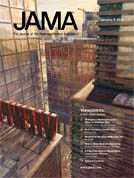JAMA:使用波立维时不必进行遗传测试
2012-01-06 MedSci原创 MedSci原创
一项新研究已发表,此研究质疑服用抗凝血药物波立维病人进行的遗传测试的有用性,质疑去年FDA关于血液稀释剂的警告。 一项32个先前临床研究新回顾的研究发表在Journal of the American Medical Association上,提到基因测试可能无法帮助这些患者确定心脏病发作或其他心脏事件更多的危险性。 波立维,一个世界最畅销的药物,由美国百时美施贵宝和法国的赛诺菲销售。它通过使

一项新研究已发表,此研究质疑服用抗凝血药物波立维病人进行的遗传测试的有用性,质疑去年FDA关于血液稀释剂的警告。
一项32个先前临床研究新回顾的研究发表在Journal of the American Medical Association上,提到基因测试可能无法帮助这些患者确定心脏病发作或其他心脏事件更多的危险性。
波立维,一个世界最畅销的药物,由美国百时美施贵宝和法国的赛诺菲销售。它通过使血小板不形成导致血栓的粘合而降低心脏病和中风风险。
在2010年,美国FDA下令制造商在波立维包装盒上添加一个警告,即此药对不能正常代谢的患者防止心脏病发作可能不有效。
FDA说,据估计,美国大约2%到14%的人是弱代谢者,他们带有一定的基因变异,这个基因形成肝脏酶CYP2C19,其中此酶可转换波立维为活性形式。
FDA已推荐医生给那些患者开高剂量波立维或氯吡格雷的处方,这里的患者是已做遗传测试,发现不能产生足够的这种酶的人。
但是,由伦敦大学Michael Holmes带领的研究人员在涉及42000例患者的新回顾性研究后,总结到,那些具有基因变异的患者并不比其他患者有更多的心脏事件。
"尽管CYP2C19基因型,氯吡格雷代谢和血小板聚集之间的联系,这一系统的回顾和Meta分析并不表明具有心血管结果的基因型的临床重要联系",由伦敦大学Michael Holmes带领的研究人员说。
唯一值得注意的例外是在支架血栓形成的患者,他们写道。
"FDA关于波立维的警告是不成熟的,没有坚实的科学基础",克利夫兰诊所基金会心脏病学家Steven Nissen在JAMA上发表的评论中说。
氯吡格雷波立维的销售总额在2011年前三季度达到54亿美元,2010年同期为49亿美元。
全球约4000万人服用此药。(生物谷bioon.com)
CYP2C19 Genotype, Clopidogrel Metabolism, Platelet Function, and Cardiovascular Events
Michael V. Holmes, MBBS, MSc; Pablo Perel, PhD; Tina Shah, PhD; Aroon D. Hingorani, PhD; Juan P. Casas, PhD
Context The US Food and Drug Administration recently recommended that CYP2C19 genotyping be considered prior to prescribing clopidogrel, but the American Heart Association and American College of Cardiologists have argued evidence is insufficient to support CYP2C19 genotype testing.
Objective To appraise evidence on the association of CYP2C19 genotype and clopidogrel response through systematic review and meta-analysis.
Data Sources PubMed and EMBASE from their inception to October 2011.
Study Selection Studies that reported clopidogrel metabolism, platelet reactivity or clinically relevant outcomes (cardiovascular disease [CVD] events and bleeding), and information on CYP2C19 genotype were included.
Data Extraction We extracted information on study design, genotyping, and disease outcomes and investigated sources of bias.
Results We retrieved 32 studies of 42 016 patients reporting 3545 CVD events, 579 stent thromboses, and 1413 bleeding events. Six studies were randomized trials (“effect-modification” design) and the remaining 26 reported individuals exposed to clopidogrel (“treatment-only” design). In treatment-only analysis, individuals with 1 or more CYP2C19 alleles associated with lower enzyme activity had lower levels of active clopidogrel metabolites, less platelet inhibition, lower risk of bleeding (relative risk [RR], 0.84; 95% CI, 0.75-0.94; absolute risk reduction of 5-8 events per 1000 individuals), and higher risk of CVD events (RR, 1.18; 95% CI, 1.09-1.28; absolute risk increase of 8-12 events per 1000 individuals). However, there was evidence of small-study bias (Harbord test P = .001). When analyses were restricted to studies with 200 or more events, the point estimate was attenuated (RR, 0.97; 95% CI, 0.86-1.09). In effect-modification studies, CYP2C19 genotype was not associated with modification of the effect of clopidogrel on CVD end points or bleeding (P > .05 for interaction for both). Other limitations included selective outcome reporting and potential for genotype misclassification due to problems with the * allele nomenclature for cytochrome enzymes.
Conclusion Although there was an association between the CYP2C19 genotype and clopidogrel responsiveness, overall there was no significant association of genotype with cardiovascular events.
本网站所有内容来源注明为“梅斯医学”或“MedSci原创”的文字、图片和音视频资料,版权均属于梅斯医学所有。非经授权,任何媒体、网站或个人不得转载,授权转载时须注明来源为“梅斯医学”。其它来源的文章系转载文章,或“梅斯号”自媒体发布的文章,仅系出于传递更多信息之目的,本站仅负责审核内容合规,其内容不代表本站立场,本站不负责内容的准确性和版权。如果存在侵权、或不希望被转载的媒体或个人可与我们联系,我们将立即进行删除处理。
在此留言







